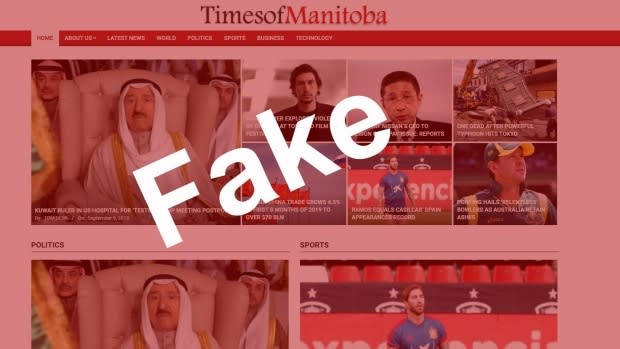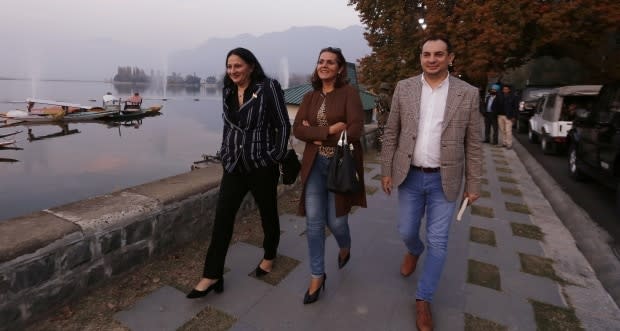Huge pro-India fake news network includes Canadian sites, links to Canadian think tanks
A huge international network of fake local news sites that push a pro-Indian government position internationally has a deep Canadian connection, CBC News has learned.
According to the EU DisinfoLab, a Brussels-based non-profit group whose goal is identifying disinformation targeting the European Union, the network includes at least 265 sites in more than 65 countries.
At least 12 of those sites pose as Canadian news outlets and use names that either mimic current media publications or old media outlets that have folded, such as The Toronto Evening Telegram. CBC has also found evidence of a further 16 sites designed to look like local Canadian news websites, all registered by the Srivastava Group.
Some of the sites have either been taken down in the last week, since some of the EU DisinfoLab's findings have been reported, or never had content uploaded to them in the first place.
All of the sites are tied to the Srivastava Group, an Indian corporation run by Ankit Srivastava, a self-described entrepreneur based in New Delhi. CBC was able to determine using website data analysis tool DomainTools. Some of the websites were registered to a bungalow in Edmonton.
The network of sites publishes content that is critical of Pakistan.
News sites with Canadian names but little activity
The purported Canadian news sites run by the network have names like the Toronto Mail, the Quebec Telegraph and the Times of New Brunswick. Many borrow the names of defunct Canadian newspapers. In all cases, the "about" section claims that the websites are local Canadian media outlets.
Most of the Canadian websites in the network have generated very little activity on social media, garnering almost no likes and shares, according to social media analytics tool BuzzSumo. Unlike many fake news networks, the sites don't seem to make money through advertising since they don't carry ads.
Alexandre Alaphilippe, executive director of the EU DisinfoLab, notes that parts of this network have been active since 2010. "It's a network that has been operating for a very long time on these questions, promoting India or denigrating Pakistan," he said. "It's not only fake media sites. They have think-tanks, NGOs and so on. It's very organized. It shows that this is something that is planned."
Controversial visit to Kashmir
The Srivastava Group was also linked to a controversial visit by right-wing members of European Parliament to Kashmir in late October, which included a meeting with Indian Prime Minister Narendra Modi.

The visit to Kashmir took place even though access to the region is extremely restricted by the Indian government, and journalists and NGOs are barred. In August, the Indian government revoked part of the constitution granting the Jammu and Kashmir state special status, instituted a curfew and cut internet and phone connections. The area has been under lockdown for more than 100 days.
According to Julian Schofield, an associate professor at Concordia University in Montreal whose studies focus on South Asia, the visit might be a way for India to promote its handling of the situation in Kashmir and make it look better when compared to its main rival, Pakistan.
"Bringing the Europeans over is saying, 'Look, we're a functioning democracy, just like you, we have the same issues as you, and essentially, we're liberal. We're multi-ethnic, multi-identity, just like you, not like Pakistan. Come visit Kashmir, we're doing our best,'" he said.
According to Indian media, that visit was financed and organized by two NGOs with connections to Srivastava: the International Institute for Non-Aligned Studies (IINS) and Women's Economic and Social Think-Tank (WESTT).
IINS was founded by Srivastava and shares a physical New Delhi address with the Srivastava group. WESTT's website was registered by M. Srivastava. The director of WESTT, Madi Sharma, is also described as the EU correspondent for the New Delhi Times — an obscure newspaper whose editor-in-chief is Ankit Srivastava.
Its website has 1.2 million followers on Facebook, but almost no interactions with its content, which is extremely unusual given that followers tend to interact with content, and suggests the followers may be fake. Sharma was reported by Indian media to have extended the invitation to the MPs to visit India, and accompanied those MPs during their time in Kashmir.

Several Indian journalists from fact-checking outlets contacted by CBC/Radio-Canada said they had never heard of the New Delhi Times before the controversy over the Kashmir visit erupted.
Schofield said that India's rivalry with Pakistan is at the centre of its foreign policy and the visit was part of its propaganda effort. "It is viable as a technique against Pakistan. If Pakistan wasn't there, India would dominate the sub-continent."
Srivastava has also republished columns from Toronto Sun columnist Tarek Fatah, who describes the two as friends, and also has links to former Liberal MP Mario Silva; the IP address used to register the website of a think-tank that was chaired by Silva is the same as that of the Srivastava group, and the site is hosted on a server administered by Srivastava.
CBC News reached out to Srivastava at multiple phone numbers, and in all cases, the person who answered the phone referred inquiries to an email address. Srivastava did not respond to multiple email inquiries.
Over the past week, Twitter has suspended several accounts linked to the network, including the accounts for EP Today, a purported news magazine centred on the European Parliament, and 4news Agency, a newswire service which served to boost the network's content. Both these sites were used to push pro-India news items.
Since EU DisinfoLab's report, all of the articles were also removed from EP Today. All that remains on the site is an apology by the owners for publishing articles from the Russian outlet RT.
Think tank website hosted by Srivastava
One of the Canadians linked to Ankit Srivastava is former Liberal MP Mario Silva.

Silva chaired a group called IFFRAS, the International Forum for Rights and Security, which describes itself as a "non-profit international think-tank" with headquarters in Toronto, Brussels, Geneva and Washington. Silva was the Liberal member of Parliament for the downtown Toronto riding of Davenport from 2004 to 2011, and is currently a distinguished visiting professor at Toronto's Ryerson University and a board member at Toronto Hydro.
Using DomainTools, CBC found that the website shares the same IP address as the Srivastava Group and EP Today, and that website for the think tank is hosted on Srivastava's server. The email address used to register the server is a Hotmail address for Srivastava.
Silva has given interviews to Times of Geneva, the New Delhi Times and 4News Agency, some of which were critical of Pakistan.
A YouTube video shows Silva sitting next to Fatah as Fatah gives a talk on Balochistan in Geneva in March of 2014.
A number listed on the IFFRAS.org website is not in service, and another number used by Silva previously in his registration of the site was also not in service.
When contacted by email, Silva said he does not "condone, participate in or support any organization that promotes inaccurate or misleading information and would never be part of any group that acts in such a manner."
Silva said that IFFRAS, the think-tank, has been inactive for a number of years, and his involvement "was limited solely to advocacy for human rights in a broad sense, fully consistent with my long-standing commitment to the promotion of human rights and equality for all persons across the world."
Silva further added he was unaware of any connections between Srivastava and the websites and newspapers that CBC had inquired about, and that he "emphatically" does not have "any connection with any group or organization you have referenced."
Toronto writer's columns reprinted on site
In an interview with CBC News, Fatah said that he was aware his columns were being republished in the New Delhi Times and said Srivastava paid him a small fee for it, though he declined to specify how much.
"Mr. Fatah is a freelance opinion columnist. Freelancers can generally resell their work after its publication in the Sun to non-competing markets, subject to the terms of their agreements with us," said Phyllise Gelfand, the vice-president of communications for Postmedia, in an email.

Fatah was also listed as the executive director of an NGO called Baluchistan (sic) House, described as a think-tank focusing on the Balochistan province of Pakistan. The region has seen ongoing insurgencies against the Pakistani government by Baloch groups seeking independence.
The now-defunct Baluchistan House website was registered by Ankit Srivastava, as were other sites seemingly built for Fatah, such as whatthefatah.com and whatthefatah.net, which never published any content.
According to Fatah, the What the Fatah project is a proposed video series featuring him that he's working on with Srivastava, while the Baluchistan House website registration may have come from an exiled Baloch leader living in London.
"I was merely involved and it never really took off, the Baluchistan House forum," he said.
Fatah's Baluchistan House organized a panel in 2017 in Geneva, where he appeared alongside Polish MEP Ryszard Czarnecki to discuss Balochistan's economic situation. Czarnecki, a conservative politician critical of Pakistan and supportive of India, was amongst the MEPs who visited Kashmir in October.
Fatah said he was not involved with the visit and did not help facilitate it. He also said that while he had met Czarnecki a few times in UN meetings, he didn't speak or meet with Czarnecki outside of that.
Fatah said he was not aware that Srivastava was running a network of fake news sites.
"Why would he do that?" said Fatah, adding it must be "some ridiculous Indian bureaucrat's idea of propaganda."
Concordia's Schofield said the network's promotion of Baloch interests clearly marks it as serving the Indian government's interests. He says that India has been supporting Balochistan independence as a way to put pressure on Pakistan.
"This is definitely political. It's basically an open secret that the Indians have been helping the Baloch," he said. "If [Ankit Srivastava] is doing this type of thing, that's what you'd call a siren alert," that he's in line with the government's policies.
Fatah said he wasn't worried about his columns being used to promote pro-India views.
"Oh, I am unashamedly pro-India. If somebody uses my writing to be pro-India, hallelujah. India is the only place that will save this universe. You can quote me on that," he said.


